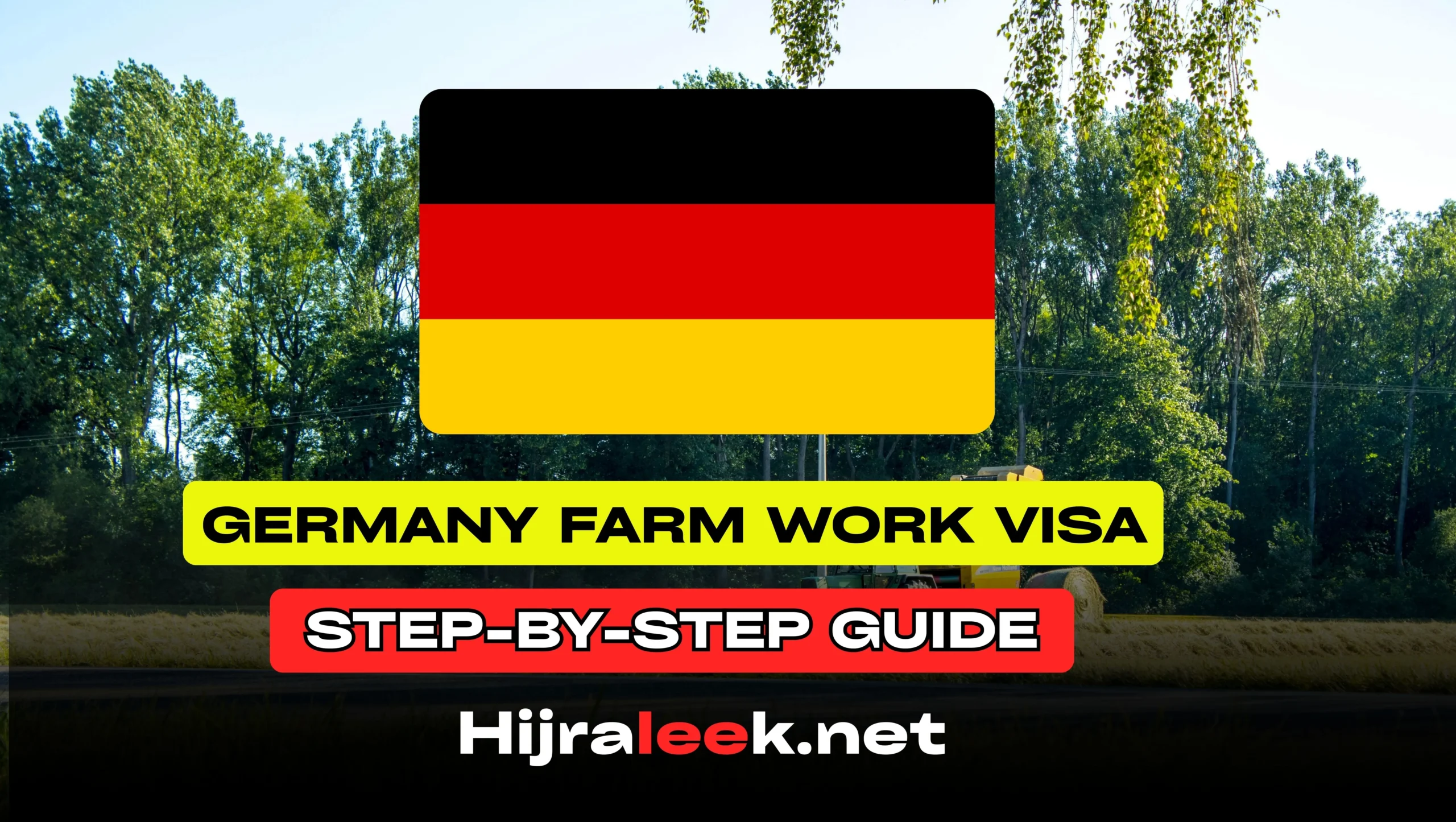The Germany Farm Work Visa 2026 offers a valuable opportunity for non-EU workers to engage in seasonal or long-term agricultural work in one of Europe’s leading agricultural nations. Germany’s robust farming sector, known for crops like wheat, potatoes, and livestock products, relies on international workers to address labor shortages, particularly in rural areas. This comprehensive guide provides a step-by-step process for securing a farm work visa, covering eligibility, application steps, job types, benefits, challenges, and frequently asked questions to help you navigate this rewarding opportunity.
What is the Germany Farm Work Visa 2026?
The Germany Farm Work Visa primarily refers to the Seasonal Worker Visa for non-EU nationals, allowing work in agriculture for up to 90 days within a 180-day period without a residence permit, or longer-term visas like the Skilled Worker Visa (Section 18a/18b of the Residence Act) for qualified agricultural roles. Seasonal roles include fruit picking, vegetable harvesting, and livestock care, while skilled roles may involve farm management or technical positions. The visa is employer-driven, requiring a job offer from a German employer who secures work authorization from the Federal Employment Agency (BA).
Germany’s agricultural sector employs thousands of seasonal workers annually, with over 200 farm jobs offering visa sponsorship in 2026. Platforms like Hijraleek connect workers with verified employers across regions like Bavaria, Lower Saxony, and Mecklenburg-Vorpommern.
Eligibility Requirements for the Germany Farm Work Visa 2026
To qualify for the Germany Farm Work Visa 2026, applicants must meet specific criteria set by German immigration authorities:
- Non-EU Citizenship: Open to third-country nationals from any country, with some bilateral agreements (e.g., with Georgia, Moldova) facilitating access. EU/EEA/Swiss nationals do not need a visa.
- Valid Job Offer: A signed employment contract from a German employer in the agricultural sector is required. For seasonal work, employers must prove no suitable EU workers are available (labor market test).
- Age: Typically 18–55 for seasonal roles, though no strict upper limit for skilled worker visas.
- Health and Character: A criminal record certificate from the home country (and any country of residence for over five years, often requiring apostille) and a medical certificate may be needed.
- Valid Passport: Must be valid for at least six months beyond the intended stay with two blank pages.
- Accommodation: Proof of accommodation, often provided by the employer, is required for visa applications.
- Financial Stability: Applicants may need to show sufficient funds for initial expenses, though this is often covered by the job contract.
- Qualifications (for Skilled Worker Visa): For roles like farm managers or agricultural technicians, qualifications must be recognized in Germany via the Anabin database or ZAB assessment. Seasonal roles typically require no formal qualifications.
- Language Skills: Not mandatory for seasonal work, but basic German (A1/A2 CEFR) or English may be preferred for skilled roles.
For detailed eligibility, visit Make it in Germany or Germany-Visas.
Step-by-Step Application Process
Applying for the Germany Farm Work Visa 2026 involves coordination between the worker, employer, and German authorities. Below is a step-by-step guide:
- Secure a Job Offer: Find a farm job through platforms like Hijraleek, Indeed, LinkedIn, or specialized job boards like Make it in Germany. The employer provides a signed contract detailing the role, duration, salary, and accommodation.
- Employer Applies for Work Authorization: For non-EU workers, the employer submits a work authorization request to the Federal Employment Agency (BA), proving no suitable EU workers are available. This process takes 2–6 weeks.
- Receive Work Authorization: The BA forwards the approval to the German consulate in the applicant’s home country and the local Foreigners’ Authority (Ausländerbehörde).
- Apply for the Visa: Submit a visa application through the Consular Services Portal or at the nearest German embassy/consulate (e.g., via VFS Global). Required documents include:
- Completed visa application form (long-stay for skilled work, short-stay for seasonal work up to 90 days)
- Valid passport (original and copies)
- Approved work authorization from the BA
- Signed employment contract
- Proof of accommodation (e.g., employer-provided housing or rental agreement)
- Health insurance covering at least €30,000 in the Schengen Area
- Criminal record certificate (apostilled and translated into German if needed)
- Two recent passport-sized photos (ISO/IEC format)
- Visa fee payment receipt (€75 for long-stay, €40 for short-stay, subject to change)
- Proof of qualifications (for skilled roles, verified via Anabin or ZAB)
- Flight itinerary or proof of travel plans
- Attend Biometric Appointment: Provide fingerprints and a photo at the embassy or consulate (e.g., VFS Global). An interview may be required to verify your application.
- Receive the Visa: Processing takes 4–12 weeks, depending on the consulate and visa type. The visa is a sticker in your passport, valid for entry into Germany.
- Arrive and Register: Upon arrival, register your address at the local Residents’ Registration Office (Bürgeramt) within two weeks (Anmeldung). For stays exceeding 90 days, apply for a residence permit at the Foreigners’ Authority within three months.
- Validate Work Permit: For skilled worker visas, the residence permit includes work authorization. Seasonal workers may not need a separate permit for stays under 90 days.
For visa application support, check VFS Global or Germany-Visas.
Types of Farm Jobs with Visa Sponsorship
Germany’s agricultural sector offers diverse roles, many with visa sponsorship:
- Fruit and Vegetable Pickers: Harvest apples, strawberries, or asparagus. Salary: €9–€12/hour or €1,500–€2,000/month.
- Livestock Caretakers: Feed and manage cattle, poultry, or pigs. Salary: €2,000–€3,000/month, often with accommodation.
- Farmhands: Perform planting, weeding, or irrigation tasks. Salary: €1,500–€2,000/month.
- Agricultural Technicians: Operate machinery or manage irrigation systems. Salary: €2,500–€3,500/month.
- Farm Managers: Oversee farm operations, requiring experience and qualifications. Salary: €3,000–€5,000/month.
- Horticulturists: Manage fruit, vegetable, or ornamental plant cultivation. Salary: €2,500–€3,500/month.
The minimum wage in Germany for 2026 is expected to be around €12.82/hour, with many employers offering accommodation and meals, especially for seasonal roles.
Benefits of the Germany Farm Work Visa
- Competitive Wages: Earn €9–€15/hour for seasonal roles, with skilled positions paying up to €5,000/month.
- Employer Benefits: Free or subsidized accommodation, meals, and sometimes transport reduce living costs.
- Cultural Immersion: Work in Germany’s scenic rural areas, experiencing local traditions and cuisine in regions like Bavaria.
- Legal Protections: Compliance with German labor laws ensures fair wages, safe conditions, and access to public healthcare.
- Schengen Mobility: Travel within the 26 Schengen countries during off days.
- Family Reunification: Long-term visas (e.g., Skilled Worker Visa) allow family members to join, subject to conditions.
- Skill Development: Gain experience in modern farming techniques, enhancing future job prospects.
Key Dates and Availability for 2026
Germany does not impose strict visa quotas for seasonal workers, but job availability peaks during harvest seasons (March–October). Applications for 2026 should begin in late 2025 or early 2026, with job offers typically posted from January. The Federal Employment Agency and platforms like Hijraleek provide updates on job and visa opportunities.
Tips for a Successful Application
- Apply Early: Job offers and visa processing are competitive. Start searching in late 2025 for 2026 roles.
- Use Trusted Platforms: Connect with employers via Hijraleek, Indeed, or Make it in Germany to avoid scams.
- Prepare Documents: Ensure all documents are complete, apostilled, and translated into German by a certified translator.
- Learn Basic German: While not mandatory, A1/A2 German skills improve job prospects and integration.
- Verify Employer: Confirm the employer is registered with the BA and has a history of hiring international workers.
- Track Application: Use the Consular Services Portal to monitor visa status and follow up if needed.
Challenges and How to Overcome Them
- Competitive Job Market: High demand for seasonal roles requires early applications. Use multiple platforms like Hijraleek to secure offers.
- Complex Documentation: Visa paperwork, including apostilles and translations, can be complex. Verify requirements with VFS Global or consulates.
- Language Barriers: Limited German proficiency may hinder communication. Use translation apps or learn basic German phrases.
- Processing Delays: Visa processing can take 4–12 weeks. Apply 2–3 months before your intended start date.
- Physical Demands: Farm work is labor-intensive. Ensure physical fitness and clarify job expectations with employers.
Seasonal Agricultural Work in France 2026
Frequently Asked Questions (FAQs)
1. What is the Germany Farm Work Visa 2026?
It includes the Seasonal Worker Visa for up to 90 days or the Skilled Worker Visa for longer-term agricultural roles, requiring a job offer from a German employer.
2. Who is eligible for the visa?
Non-EU nationals with a job offer, valid passport, and health/character checks. Skilled roles require recognized qualifications. EU/EEA/Swiss nationals need no visa.
3. How can I find farm jobs with visa sponsorship?
Use platforms like Hijraleek, Indeed, LinkedIn, or Make it in Germany.
4. What documents are required for the visa?
Include a visa form, passport, work authorization, employment contract, accommodation proof, health insurance, criminal record certificate, and photos.
5. How long does the visa last?
Seasonal Worker Visa: up to 90 days in 180 days. Skilled Worker Visa: up to 4 years, renewable with a residence permit.
6. Can I bring my family?
Skilled Worker Visa holders can apply for family reunification; seasonal visas typically do not allow this.
7. How much can I earn in farm jobs?
Seasonal workers earn €9–€15/hour (€1,500–€2,500/month); skilled roles pay €2,500–€5,000/month.
8. When should I apply for 2026 jobs?
Start in late 2025 or early 2026, as harvest seasons run March–October. Check Hijraleek for updates.
9. Is German language proficiency required?
Not mandatory for seasonal roles, but basic German (A1/A2) enhances job prospects for skilled positions.
10. What if my visa application is rejected?
Review the rejection reason, correct issues, and reapply with a new job offer and complete documentation.
Conclusion
The Germany Farm Work Visa 2026 opens doors to rewarding agricultural work, offering competitive wages, cultural immersion, and professional growth in Germany’s thriving farming sector. Whether pursuing seasonal or skilled roles, early preparation, trusted platforms like Hijraleek, and thorough documentation are key to success. Resources like Make it in Germany, Germany-Visas, and VFS Global provide essential support. Start your journey today and experience the rewards of working in Germany’s picturesque farmlands.




















